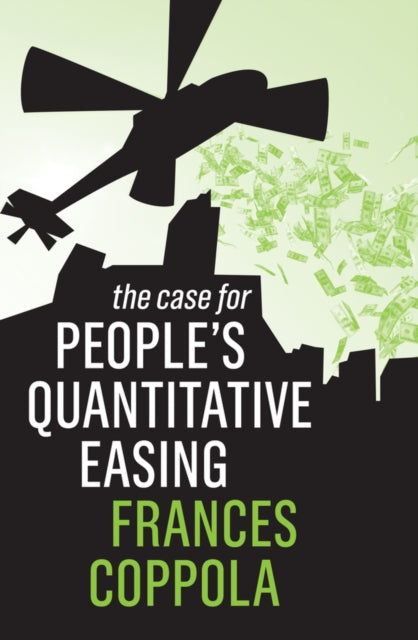Frances Coppola
Case For People's Quantitative Easing
Case For People's Quantitative Easing
YOU SAVE £1.08
- Condition: Brand new
- UK Delivery times: Usually arrives within 2 - 3 working days
- UK Shipping: Fee starts at £2.39. Subject to product weight & dimension
Bulk ordering. Want 15 or more copies? Get a personalised quote and bigger discounts. Learn more about bulk orders.
Couldn't load pickup availability
- More about Case For People's Quantitative Easing
Central banks created trillions of dollars of new money to prevent deflation and restore economic growth, but it went to the rich, big corporations, and banks, leading to stagnation. Frances Coppola argues for a 'peoples QE' to go directly to ordinary people and small businesses to restore crisis-hit economies and solve long-term challenges.
Format: Paperback / softback
Length: 140 pages
Publication date: 28 June 2019
Publisher: Polity Press
In the aftermath of the 2008 financial crisis, central banks initiated a massive infusion of trillions of dollars into financial markets through a policy known as "quantitative easing" (QE). The primary objective of QE was to mitigate deflation and stimulate economic growth. However, the distribution of this newly created money was far from equitable. Instead, it overwhelmingly benefited the wealthy, who had little need for additional capital. This allocation of resources led to a decade of stagnation rather than recovery, as the crisis-ridden economies struggled to regain their footing. The failure of QE became evident as it failed to address the root causes of the crisis and address the broader economic challenges facing society.
In her book, Frances Coppola advocates for a "people's QE" approach, which aims to directly distribute money to ordinary individuals and small businesses. She argues that this approach is not only fairer but also more effective in restoring crisis-hit economies and addressing the long-term challenges posed by aging populations, automation, and climate change.
Coppola begins by examining the origins of the 2008 financial crisis and the role that reckless lending by big corporations and banks played in its escalation. She highlights the disproportionate impact of the crisis on ordinary workers, who lost their jobs, homes, and savings. Coppola argues that the failure of QE was due to its failure to address the underlying economic inequality and to provide meaningful support to those who were most affected by the crisis.
Under a "people's QE" framework, Coppola proposes a series of measures to ensure that the benefits of economic stimulus are distributed more fairly. These include direct transfers to individuals, tax cuts for low- and middle-income households, and investments in infrastructure and renewable energy projects. Coppola also advocates for policies that promote job creation and support small businesses, recognizing the crucial role they play in driving economic growth and creating employment opportunities.
One of the key arguments put forth by Coppola is that a "people's QE" approach can help to address the long-term challenges posed by aging populations. By providing financial support to individuals and small businesses, it can help to alleviate the burden of retirement and healthcare costs, which are often a significant source of financial stress for older individuals. Additionally, by investing in infrastructure and renewable energy projects, a "people's QE" approach can help to create jobs and stimulate economic growth, which can in turn reduce the impact of aging populations on the economy.
Another important aspect of a "people's QE" approach is its potential to address the challenges posed by automation and climate change. By investing in education and training programs, it can help to ensure that workers are equipped with the skills necessary to adapt to the changing job market and to participate in the green economy. Additionally, by promoting sustainable practices and investing in renewable energy projects, a "people's QE" approach can help to mitigate the impact of climate change and create a more sustainable future for generations to come.
In conclusion, the failure of QE to address the root causes of the 2008 financial crisis and to distribute its benefits more fairly highlights the need for a new approach. Frances Coppola's "people's QE" approach offers a promising solution to this problem, by distributing money directly to ordinary individuals and small businesses and investing in infrastructure and renewable energy projects. By addressing the underlying economic inequality and providing meaningful support to those who are most affected by the crisis, a "people's QE" approach can help to restore crisis-hit economies and create a more sustainable and equitable future for all.
Weight: 170g
Dimension: 124 x 189 x 12 (mm)
ISBN-13: 9781509531301
This item can be found in:
UK and International shipping information
UK and International shipping information
UK Delivery and returns information:
- Delivery within 2 - 3 days when ordering in the UK.
- Shipping fee for UK customers from £2.39. Fully tracked shipping service available.
- Returns policy: Return within 30 days of receipt for full refund.
International deliveries:
Shulph Ink now ships to Australia, Belgium, Canada, France, Germany, Ireland, Italy, India, Luxembourg Saudi Arabia, Singapore, Spain, Netherlands, New Zealand, United Arab Emirates, United States of America.
- Delivery times: within 5 - 10 days for international orders.
- Shipping fee: charges vary for overseas orders. Only tracked services are available for most international orders. Some countries have untracked shipping options.
- Customs charges: If ordering to addresses outside the United Kingdom, you may or may not incur additional customs and duties fees during local delivery.


